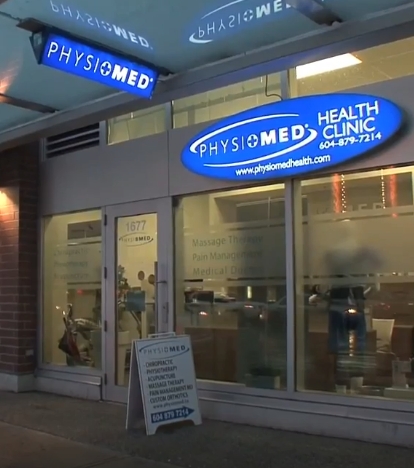Physiotherapy: The Simple Way to Relieve Your Shoulder Pain
Shoulder pain can present itself in many ways. Maybe you feel pain in your shoulder when you’re trying to get in a comfortable sleeping position, or maybe you notice it when you reach to your top cabinet to grab a glass. However your shoulder pain may present itself, it’s no secret that it physically limits your life.
There are many different types of pain that you may feel in your shoulders, such as soreness of a pulled muscle or the agonizing bone-on-bone friction of arthritis. Whether your pain is acute or chronic, Physiomed can help you manage it. If you have been experiencing shoulder pain that’s causing limitations in your daily life, contact our Vancouver physiotherapy practice to schedule a consultation and find out how we can bring you relief!
How did my shoulder pain develop?
The shoulder is an extremely complex part of the body. It is a “ball-and-socket joint,” meaning that the humerus (head of the upper arm bone) fits perfectly in the corresponding space within the scapula (shoulder blade). Each end of the bone is protected by a thick layer of cartilage that prevents the bones from rubbing together. The shoulder also contains fluid-filled sacs known as bursae that prevent the tendons from rubbing against the bones.
Your shoulders can accomplish several physical feats due to their structure – however, this also means that they are susceptible to an increased risk of injury because of their complexity. If something becomes damaged in the make-up of the shoulders, pain and discomfort can develop. This pain may range from a dull ache to shooting pains, depending on the severity of the condition.
If your pain is stemming from tendon impingement, it will generally occur as you lift your arm, fading before it is raised completely skyward. If your pain is a result of shoulder degeneration, it is likely that you will feel persistent aches every time you move your arm in certain directions. Pain from an acute injury can be sudden and intense, making it difficult for you to move your shoulder at all.
Common conditions resulting in shoulder pain:
The number of reasons why shoulder pain may develop is vast. However, some of the most common causes include:
Dislocation.
Dislocation of the shoulder occurs when the head of the humerus pops out of place. This type of injury is extremely painful and unfortunately makes you more vulnerable to recurrence after the first dislocation occurs.
Arthritis.
Osteoarthritis and rheumatoid arthritis are the two most common types of arthritis. Osteoarthritis occurs when the cartilage in the shoulder joint experiences significant “wear and tear,” typically due to age or excessive overuse. Rheumatoid arthritis occurs when the immune system sees the joints as a threat. The immune system attacks the membranes surrounding the shoulder joint, resulting in pain and inflammation.
Tendinitis.
Tendinitis in the shoulder joint occurs when the joint is excessively overused. Symptoms include swelling and painful impingement when raising the affected arm. This typically happens due to the demands of a sport or labor-intensive job, which can cause the tendons to experience ongoing inflammation.
Frozen shoulder.
Medically referred to as “adhesive capsulitis,” a frozen shoulder can occur if you have been bedridden for an extended period of time or if your arm has been in a cast or sling for a while. When you don’t have opportunities to exercise the shoulder, the tissues can stiffen upon you, thus causing this painful condition to occur.
Contact Physiomed for shoulder pain relief!
Our physiotherapy treatments can help manage your shoulder pain, no matter how severe it may be. Physiotherapy is safe, non-invasive, and pain-free. Our Vancouver physiotherapists are licensed and dedicated to designing the best-individualized treatment plan for your needs. In fact, many of our patients have reported finding improvement and relief after just a few short physiotherapy sessions – and sometimes less!
At your initial appointment, you will undergo a comprehensive evaluation to determine the nature of your condition and your needs. This may include a series of tests, used to get the best idea for treatment. Our physiotherapist may suggest taking X-rays to illustrate any dislocations or signs of arthritis. Range of motion tests may also be conducted in order to discover which of your soft tissues are contributing to your pain.
Once our physiotherapist has created your treatment plan, you will begin working on targeted exercises, stretches, and modalities. Treatment plans for shoulder pain typically include gentle exercises, which have proven to reduce the stiffness of frozen shoulders and ease the pain of osteoarthritis. Strengthening programs may also be implemented as a way to rehabilitate injured muscles or help stabilize a shoulder that is prone to dislocation.
If your shoulder pain is limiting your life, Contact Us Today at Vancouver, BC Center as soon as possible to secure your appointment. We will manage and treat your condition so you can comfortably get back to your daily life!
Visit our Vancouver clinic location today to get started! Make an appointment now!
Read our blog post on 5 conditions that may be causing your shoulder pain by clicking here!
FAQs
What is the most common shoulder injury?
Sprains and strains are among the most commonly experienced overuse injuries in the shoulder area. A strain occurs when a muscle or tendon is stretched too far or torn. A sprain occurs when a ligament is stretched too far or torn. Strains and sprains can result in an ongoing shoulder pain that may make it difficult to partake in exercise or even daily tasks. If the strain or sprain is minor, it can sometimes be iced at home and healed with rest. More severe strains and sprains will often require physical therapy treatments. Additional shoulder injuries include a torn cartilage, dislocation, tendinitis, frozen shoulder, and arthritis.
How do you know if my shoulder injury is serious?
Your shoulders can accomplish several physical feats due to their structure – however, this also means that they are susceptible to an increased risk of injury because of their complexity. If something becomes damaged in the make-up of the shoulders, pain and discomfort can develop. This pain may range from a dull ache to shooting pains, depending on the severity of the condition. If you are experiencing severe pain, or pain lasting three months or longer, it could be indicative of a deeper issue.
How do I get my shoulder to stop hurting?
If your shoulder is causing you discomfort, physical therapy is the best way to ensure the highest rate of relief. Our physical therapists are highly trained to help improve the flexibility and range of motion in your shoulder, in addition to relieving your pain and discomfort. This will be done through an individualized treatment plan designed specifically for you, and may include any combination of treatment methods as your physical therapist deems fit, including manual therapy, ice and heat therapies, electrical nerve stimulation, or ultrasound. Your physical therapist will also prescribe targeted exercises and stretches to help regain your optimal shoulder function.
How can physical therapy help with shoulder pain?
Two of the biggest goals of physical therapy are 1) to alleviate your pain and 2) to improve your function. Your physical therapist will work with you to make sure that both of these are achieved throughout your physical therapy sessions. Physical therapy has been proven to manage the pain of several conditions, and in many cases, it has even been proven to eliminate shoulder pain altogether, thus making the need for harmful drugs or surgical intervention obsolete.



